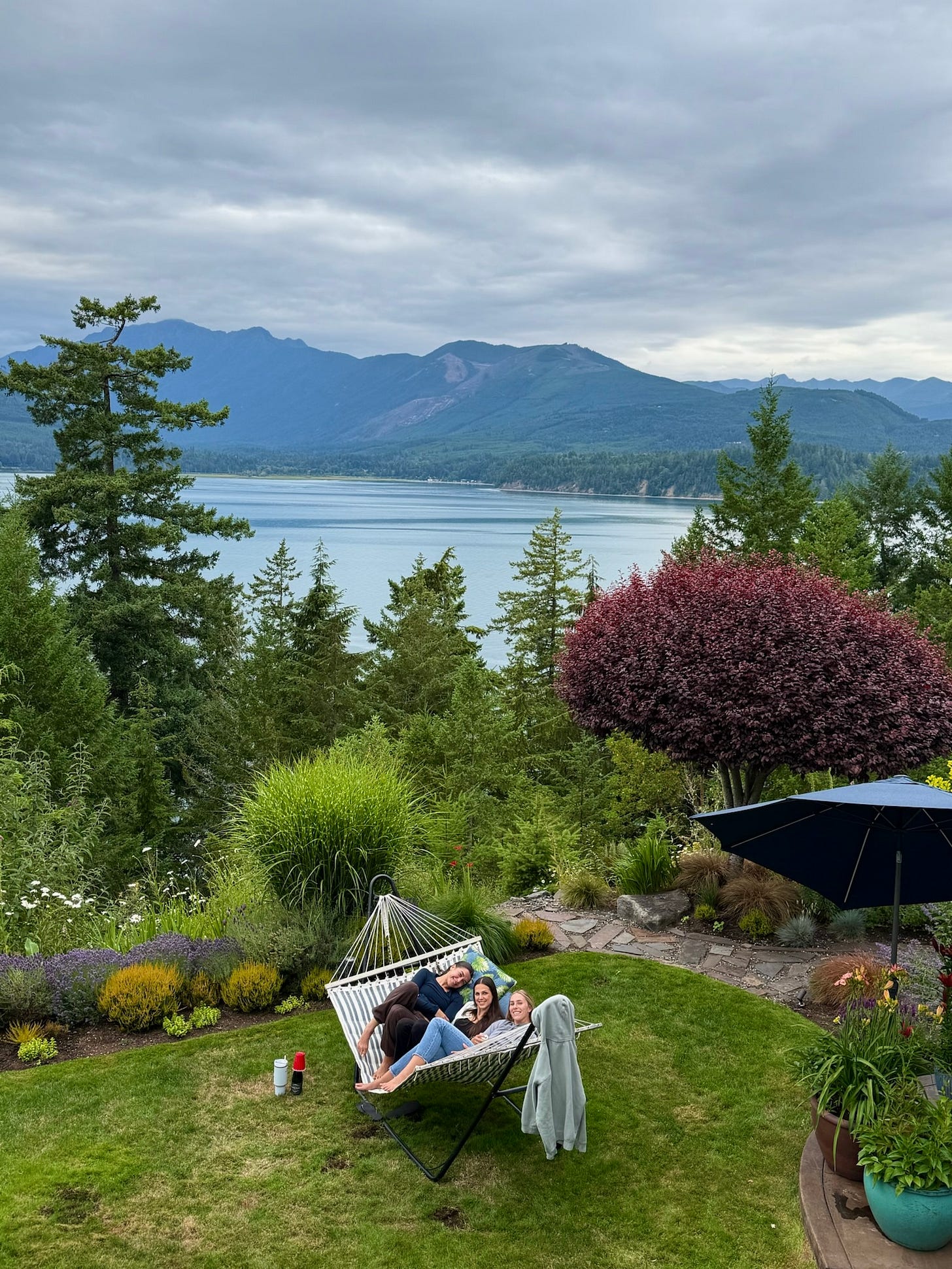It’s Fourth of July weekend. The U.S. just rang in its 249th birthday—a number that invites a longer view. Most great civilizations, historians remind us, don’t last more than 250 to 300 years in their dominant form. Empires rise, consolidate, and eventually recede. It’s not always a fall, but often a fading. To mark another year in America is to mark our proximity to that arc. Not necessarily in fear, but in context. We are not as permanent as we pretend to be. We are specks in the sediment—momentary, shifting, carried along by currents far older than us.
I’m taking the ferry from Seattle to Bainbridge Island. It’s one of those perfect Northwest mornings—gray, but soft. The Sound shimmers like brushed metal, the water carrying us slow and steady through the fog—ancient and indifferent, like so much of the water I’ve been thinking about lately. I stand on the bottom deck, cold coffee in one hand, phone in the other. Refreshing the news.
Meanwhile, Central Texas—once a place I called home—is underwater. The Guadalupe River has spilled its banks—one of many reminders that water gives and water takes. Later, I’d find myself tracing its symbolism across scripture and empire alike. Friends text updates: photos of submerged homes, evacuation warnings, children of coworkers who have gone missing. The algorithms serve it all up alongside market takes and memes, AI pitch decks and another Medium thinkpiece on Mamdani, the Big Beautiful Bill, “the death of venture.” The world feels impossibly full and utterly hollow.
The ferry keeps gliding forward.
That moment became a small metaphor for everything I’ve been feeling lately: stillness in motion. Presence inside chaos. The weird dissonance of being somewhere so slow and beautiful while the world (both mine and the capital markets’) burns—or floods.
We keep saying the world is ending. But when you’re surrounded by redwoods and friends you love so much you often feel like exploding, when you spend the afternoon laughing on the grass, it’s hard to believe it’s all unraveling. It’s easier to believe we just don’t know how to read the signals anymore. The media’s hype cycles and our recency bias flatten time, making it nearly impossible to hold the longer arc of life near, or to remember that chaos is just one turn in the cycle.
There’s a difference between being plugged in and being attuned. Between being informed and being wise. That difference—subtle, but everything—is what I’m chasing.
Seattle has a way of softening your edges. The slowness isn’t performative. It’s native. Being out of Eastern time feels like a quiet rebellion for me, an invisible unhooking from the rhythm of urgency. New York, NY (GMT-4), or nowhere.
Here in Seattle, moss grows on everything, even road signs. Trees fall and are left to rot into the forest floor, unbothered. Maybe even become a nurse log. No one seems in a rush to disrupt anything. The stillness doesn’t resist progress; it redefines it. A kind of intelligence lives here that is patient and porous. The kind that feels increasingly rare in a world obsessed with velocity.
I’ve spent most of the last few months toggling between decks and disasters. Talking to founders trying to raise into headwinds, LPs holding back allocations, ex-operators looking for what’s next, recent grads unemployed and SOL (tag yourself). There’s a sense that the game is somehow simultaneously speeding up and slowing down. That the rules are changing. That the old myths—scale fast, burn bright, go big or go home—are dissolving. Not because they’ve been disproven, but because they feel spiritually outdated.
Burnout isn’t just for founders. The system feels frayed.
And yet, there’s something quietly regenerative about this moment. I keep thinking of evergreen trees—not the funds, though the metaphor tempts. One survives by bending with the seasons. The other too often postures permanence, trying to outperform time itself. In venture, we rarely allow for dormancy. We reward speed, not stewardship. But everything alive has cycles. Capital needs time to root, too.
I’ve been trying to collect small gestures of wisdom lately.
Like: A friend who only checks the news once a week. Another who keeps a printout of Ecclesiastes 3 taped to her monitor ("There is a time for everything…"). A mentor who said, over lunch, "You can’t build anything true if you’re only ever reacting."
Or this moment right now: the feeling of ferry fog, drifting you slowly toward somewhere new, even if you can’t see the shoreline yet, while something unnamed tugs gently in the opposite direction.
The Texas flood reminds me of our fragility. But it also reminds me that none of this is new. We’ve always lived in a world of unpredictable systems—weather, markets, relationships. It’s just that now, we mistake visibility for control. We confuse signal with saturation.
Water has always been a canvas for human meaning. In ancient scriptures, it’s painted as both purifier and sustainer. The Bible depicts God as “the fountain of life-giving water” – an eternal source of renewal – and warns against turning to false substitutes, likening idols to “cracked cisterns, which cannot even hold water.” But water is also judgment. It floods the earth in Genesis, sparing only Noah and his family. It drowns Pharaoh’s armies in Exodus, even as it parts to liberate Israel. It sustains life in the desert but also marks boundaries that must be crossed in faith. It frees—and it overwhelms. It baptizes—and it drowns. Its power, like God’s, is both gentle and fearsome. To follow the currents of water in scripture is to trace a theology of paradox: that which gives life also takes it.
Philosophers, too, have long drawn wisdom from water’s ways. “You can never step into the same river twice,” Heraclitus once said. The river you wade in today is not the one you entered yesterday – a humbling reminder of life’s constant flux. Meanwhile, Lao Tzu praised water’s yielding power: “Nothing in the world is as soft and yielding as water. Yet for dissolving the hard and inflexible, nothing can surpass it.”
The gentle, in time, overcomes the rigid. The regenerative outlasts the reactionary. That’s the kind of investing I want to practice. The kind of living I want to choose. The kind of career I want to root into. The kind of person I want to become—less about performance, more about presence. In work, in love, in relationships.
Maybe wisdom lives somewhere between the push notification and the off-grid retreat. Not fully unplugged, but not fully online either.
Call it attunement.
And maybe the best investors, the best friends, the best builders I know—are the ones who are still enough to notice what the rest of us scroll past. Who move like ferries across choppy water—steadily bringing others a little closer to where they hoped to be.
So here’s my postcard from Seattle. The air smelled like cedar. The coffee was expensive but warm. We danced in the kitchen. We grieved the lives lost in Texas—how quickly floodwaters take what we assume is steady. I thought about someone I miss. Someone I once saw as a constant. It’s disorienting, the way time moves without asking, how recency masquerades as permanence, and how easily we confuse control with closeness. How strange it is that the heart can hold both absence and presence, devastation and joy, all at once. I kept thinking: hold your people close. None of this is promised. The venture market might be breaking—or maybe just breaking open. Either way, I’m less worried than I used to be.
Because the river floods, and then it recedes. The forest burns, and then it grows. One hopes that in due time, you learn when to log off. You learn when to listen. You learn how to carry each other through the storm. And you remember: some (maybe all) of the most vital things flow slow. Like water. Like wisdom.








Hey! I saw your post on my homepage and wanted to drop by and send you some good vibes. Whenever you have a moment, I’d be grateful if you could do the same. I’m always happy to support and lift each other up!